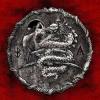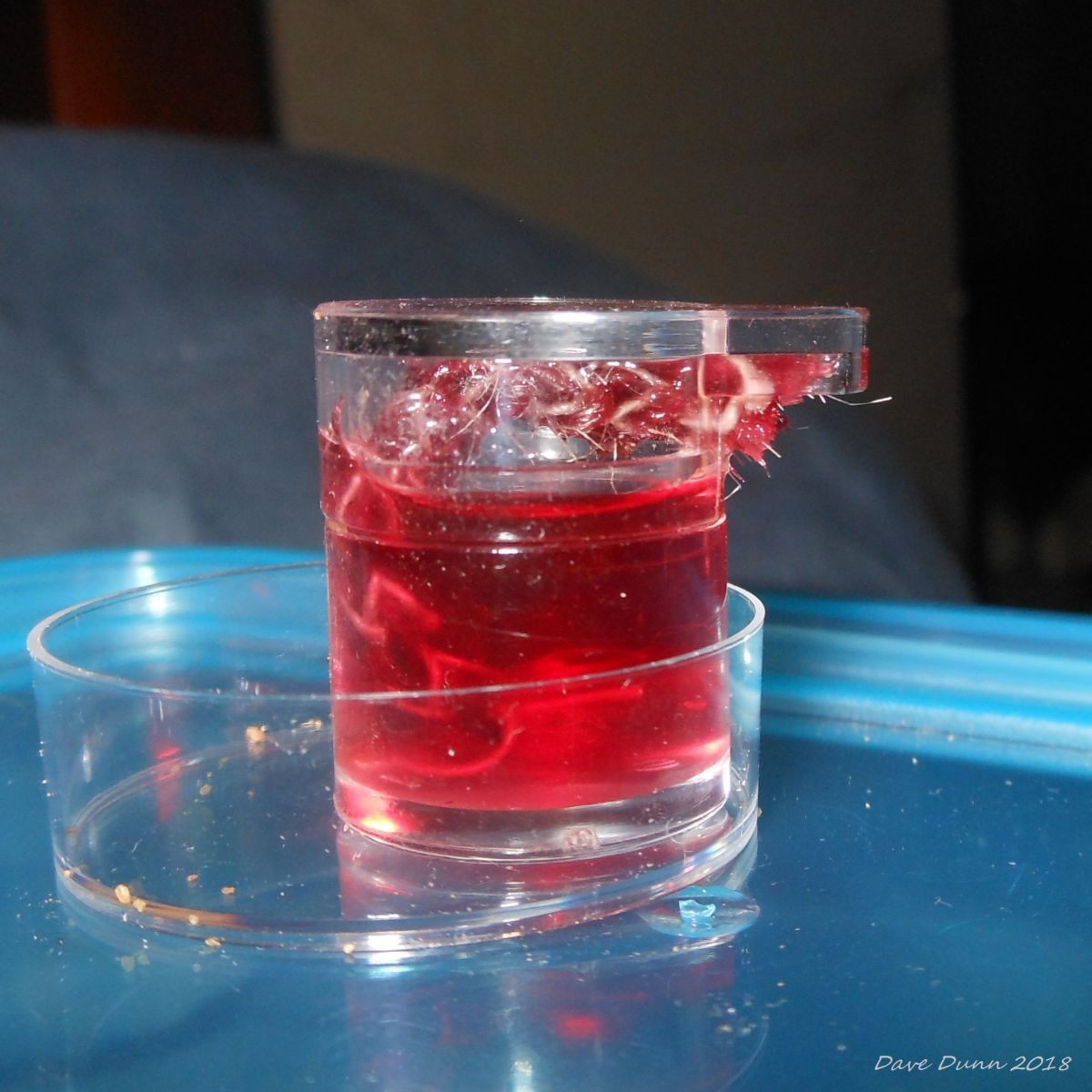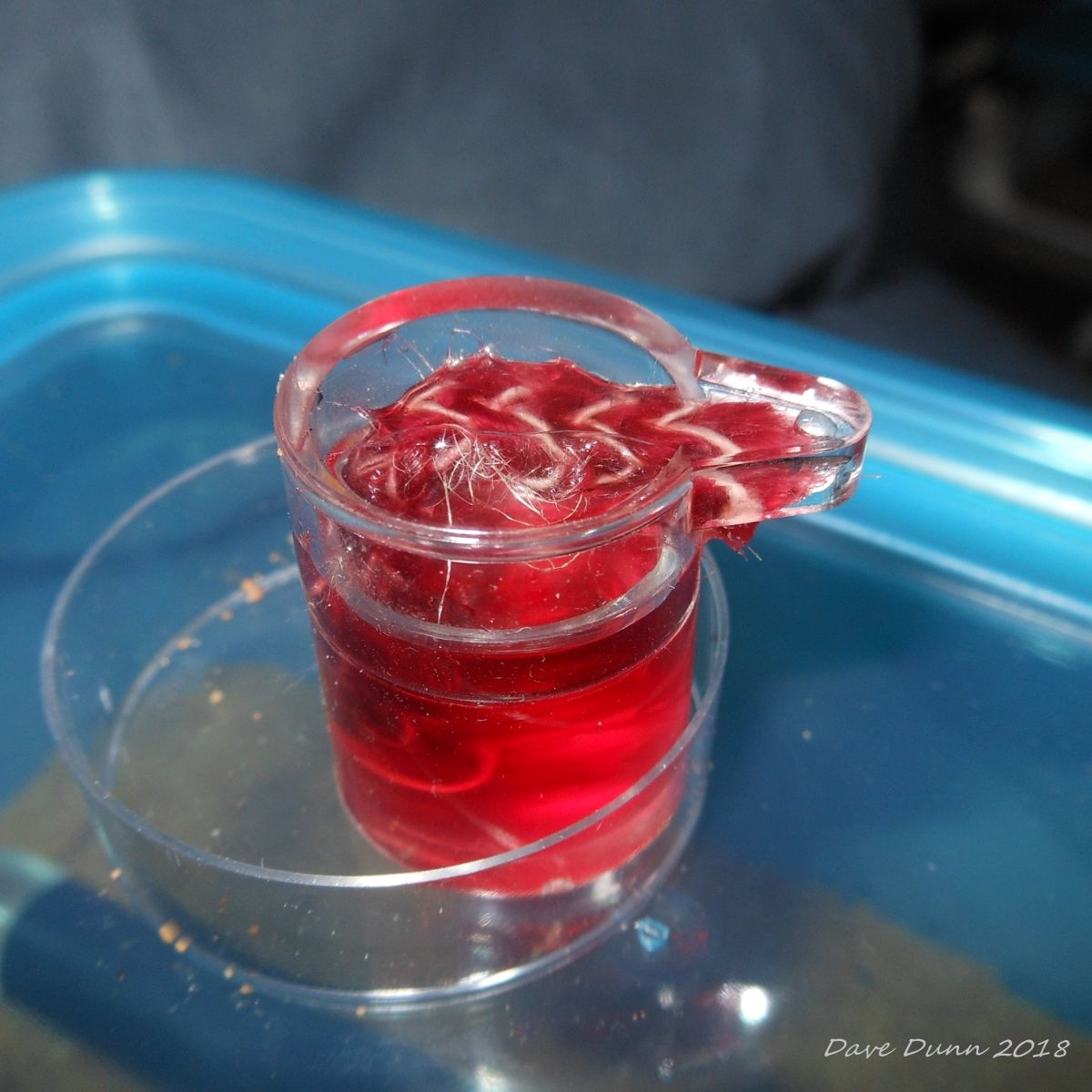- Formiculture.com
- Forums
- Gallery
- Members
- Member Map
- Chat

Dspdrew's Liquid Feeder 01 Research and Design (Updated 5-30-2016)
Started By
dspdrew
, Sep 30 2015 1:36 PM
83 replies to this topic
#81
 Offline
-
Posted August 16 2018 - 8:10 PM
Offline
-
Posted August 16 2018 - 8:10 PM
After reading this and Crystals thread on feeders I experimented a little myself. I had ordered 3 types of ant feeders/waterers online, the typical gravity fed types much like the feeders and waterers that clip onto bird cages, very similar to the first design shown in Crystals' thread. I found they worked well and didn't leak UNTIL the ants pile debris on them in which case they 'wick out' into the substrate overnight.
After seeing the feeders that utilise a wick I thought why not just use the ones I have upside down?
I bought 2 thicknesses of jute (hessian string basically) to try. I cut lengths to fit the feeders, one end reaching what is now the bottom of the reservoir and one end jammed into the small 'dish' where the water pools when used as intended, this is now at the top. I used sugar water coloured pink for visibility and left them overnight.
The thin jute string did not wick water up to be accessible but the thicker jute worked really well. No water dripped or ran down the side, the jute held it nicely. Time to test with ants.
If you can visualise it you have a feeder with a wick, the wick protrudes from the hole at the top into an inverted pool which is now a cover for the wick, no sand can be put on top of the wick as it covered and is only accessible from underneath. Fool(ant)proof right?
Nope! The next day in one formicarium/outworld there was a triangular pile of sand up the side of the feeder touching the wick which drained the feeder! Unbelievable!
Thinking that perhaps liquid had run or dripped down the side of the feeder I removed them for more testing. After 3 days no sign of any leaking at all, the sides of the feeders were still dry and clean with no moisture or sticky residue.
So either they've had the foresight to build a ramp to reach the wick to bury it (they can easily climb to drink from it), not out of the realms of possibility, or more likely have carried a grain of sand up to the wick, it's fallen off so they've carted another grain up to the wick, that's fallen, and so on until the pile of sticky sand reached the wick at which point the feeder was drained.
Talk about determined to make a mess!
Two other colonies haven't done this, it's working fine for them, it was just one of my two Camponotus consobrinus that managed it. I daresay that even one of Drews' cone shaped feeders would have suffered the same fate if the ants were so inclined.
I'm not totally discouraged, it still works well in most cases, but for now I'm placing them in small petri dishes in case they do it again.
I'll add pictures when I can to better explain, I can't post pictures or links using the phone, but I thought I'd relate my experience and bump the thread for others.
After seeing the feeders that utilise a wick I thought why not just use the ones I have upside down?
I bought 2 thicknesses of jute (hessian string basically) to try. I cut lengths to fit the feeders, one end reaching what is now the bottom of the reservoir and one end jammed into the small 'dish' where the water pools when used as intended, this is now at the top. I used sugar water coloured pink for visibility and left them overnight.
The thin jute string did not wick water up to be accessible but the thicker jute worked really well. No water dripped or ran down the side, the jute held it nicely. Time to test with ants.
If you can visualise it you have a feeder with a wick, the wick protrudes from the hole at the top into an inverted pool which is now a cover for the wick, no sand can be put on top of the wick as it covered and is only accessible from underneath. Fool(ant)proof right?
Nope! The next day in one formicarium/outworld there was a triangular pile of sand up the side of the feeder touching the wick which drained the feeder! Unbelievable!
Thinking that perhaps liquid had run or dripped down the side of the feeder I removed them for more testing. After 3 days no sign of any leaking at all, the sides of the feeders were still dry and clean with no moisture or sticky residue.
So either they've had the foresight to build a ramp to reach the wick to bury it (they can easily climb to drink from it), not out of the realms of possibility, or more likely have carried a grain of sand up to the wick, it's fallen off so they've carted another grain up to the wick, that's fallen, and so on until the pile of sticky sand reached the wick at which point the feeder was drained.
Talk about determined to make a mess!
Two other colonies haven't done this, it's working fine for them, it was just one of my two Camponotus consobrinus that managed it. I daresay that even one of Drews' cone shaped feeders would have suffered the same fate if the ants were so inclined.
I'm not totally discouraged, it still works well in most cases, but for now I'm placing them in small petri dishes in case they do it again.
I'll add pictures when I can to better explain, I can't post pictures or links using the phone, but I thought I'd relate my experience and bump the thread for others.
#82
 Offline
-
Posted August 16 2018 - 10:41 PM
Offline
-
Posted August 16 2018 - 10:41 PM
That's why I designed mine exactly the way they are. I've never had ants drain one of my feeders.
- DaveJay likes this
#83
 Offline
-
Posted August 16 2018 - 10:57 PM
Offline
-
Posted August 16 2018 - 10:57 PM
Oh I'm quite certain yours is a superior design, if I could I'd be buying or copying them. Apart from trying what I described above I'm limited to copying some of your first attempts in this thread or Crystals designs in the other thread. I did actually buy small containers and mini jars and test tubes when I bought the jute but then the idea to invert the commercial feeders I had occurred to me as there's no way they can cover the top with sand and bury the wick. I wasn't expecting them to make a 2-3cm pile of sand up the side and drain the feeder that way though!
#84
 Offline
-
Posted August 18 2018 - 12:41 AM
Offline
-
Posted August 18 2018 - 12:41 AM
This is what I had, the wick has a roof over it so you'd think it'd be safe but no, one C. consobrinus had built a tapering tower of sand up the side and it drained out into the substrate! Still no problem in three other colonies though, I've put them in petri dishes just in case but there's been no leakage at all.


I've been trying to post a link to a particular post but I can't seem to, I show the process here though :
Edited by DaveJay, August 18 2018 - 3:19 AM.
1 user(s) are reading this topic
0 members, 1 guests, 0 anonymous users
















